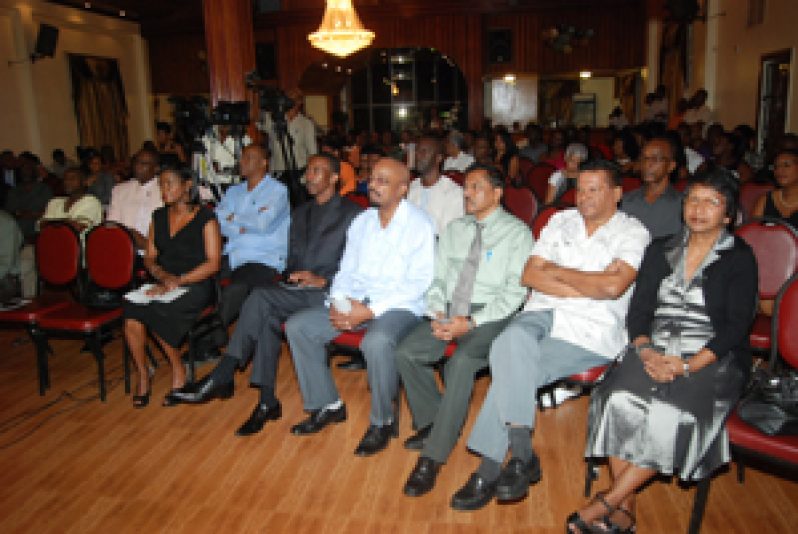Caribbean challenged towards new, innovative economic growth approaches
THE need for the Caribbean region to consider new and innovative approaches to generating economic growth and transformation and for greater collaboration and integration efforts were highlighted yesterday.  It was at the opening of the twenty-fourth session of the Caribbean Development and Cooperation Committee (CDCC) convened by the Economic Commission for Latin America and the Caribbean (ECLAC) at the Guyana International Conference Centre, Liliendaal, East Coast Demerara.
It was at the opening of the twenty-fourth session of the Caribbean Development and Cooperation Committee (CDCC) convened by the Economic Commission for Latin America and the Caribbean (ECLAC) at the Guyana International Conference Centre, Liliendaal, East Coast Demerara.
CARICOM Secretary General, Ambassador Irwin La Rocque in his remarks, acknowledged that the CDCC is meeting at a time when, more than ever, the Caribbean needs to consider new and innovative approaches to generating economic growth and transformation.
“I am, therefore, particularly pleased about the establishment of the Caribbean Development Roundtable which had its Second Meeting yesterday in order to address issues related to macro-economic policy for structural transformation and social protection in Small States,” he said.
According to him, “The achievement and maintenance of macro-economic stability are critical to stimulating the growth process and for providing the right signals to influence economic actors.”
The Secretary General said it is important that any framework for economic stability and growth should also address social protection policies for the poor and vulnerable groups in the society.
EXTERNAL DEVELOPMENTS
Given their inherent vulnerabilities, he reminded that CARICOM States continue to be significantly impacted by external developments, especially the volatility of international prices of commodities and uncertainties in international financial markets and, more recently, the possibility of another global recession occasioned by the Eurozone crisis.
“When associated with our susceptibility to the ravages of natural disasters, members of our Community have limited capacity to make the adjustments necessary to reduce their economic vulnerability. As such, the macroeconomic policy framework is probably the major tool available to CARICOM States to reduce vulnerability and build economic resilience over time,” La Rocque agreed.
He said building economic resilience and sustainable economic development in CARICOM requires concerted efforts towards maintaining economic stability and ensuring market efficiency in order to provide the conditions required for economic transformation and global competitiveness.
Such a resilience building strategy requires cooperation and collaboration at many levels among CARICOM Member States within the context of the CARICOM Single Market and Economy (CSME), with the multilateral financial community and development partners, as well as with institutions like ECLAC, which share similar objectives to the Caribbean Community, he posited.
La Rocque said: “We are ever conscious that the sustained economic growth and competitiveness which we seek will only result if we pay simultaneous attention to the social and environmental aspects of our development. Any strategy for regional development will be successful only to the extent that it promotes and ensures coherence and synergies among these mutually reinforcing dimensions.”
Minister of Youth Empowerment and Sports of Grenada, Mr. Patrick Simmons recalled that the last time the CDCC met in Grenada in 2010, the average Gross Domestic Product (GDP) growth rate in the Caribbean sub-region was 0.5 percent and, for the year 2012, it is predicted to grow by 2.7 percent on an average.
He said he is convinced that the progress being made in the sub-region could not have been possible without the efforts of organisations such as ECLAC and such gatherings, where best practices are shared, concerns are heard and solutions derived.
ALWAYS CHANGING
“Indeed, we live in a dynamic world where circumstances are always changing. What must not change is our commitment to work diligently to ensure that the Region’s economy match up to the aspirations of its people,” Simmons advised.
Guyana’s Foreign Affairs Minister, Mrs. Carolyn Rodrigues-Birkett, in welcoming the other participants, concurred that the meeting is taking place at a time when most Member States “are still struggling to recover from the impact of the global financial and economic crisis.”
“In this post-financial crisis context, the design and implementation of development strategies require new approaches which should address persistent structural problems, not only in the financial and economic sectors but moreso in the social sector,” she said.
She also mentioned the challenge of climate change, which urgently requires the formulation and implementation of new strategies to foster adaptation, mitigation and risk reduction and reinforces the need for greater collaboration and integration efforts among countries in the Region, in order to address these global challenges with a regional focus.
Director of ECLAC Sub-Regional Headquarters for the Caribbean, Ms. Diane Quarless said: “The CDCC is meeting for the first time in Guyana, a Caribbean country on the South American continent. This event here is, therefore, auspicious in its symbolic meaning.”
She noted that Guyana is host to the CARICOM Secretariat and, until very recently, served as chair of the Union of South American Nations (UNASUR).
STRONGER LINKAGES
“Guyana is now connected by road to Brazil and, together with improved access, we are seeing an increase in opportunities not only in terms of trade but also in investment, employment and technical cooperation. These are foundations for widening and deepening the integration of Latin America and the Caribbean so the CDCC, at this session, is to give renewed attention and commitment to forging stronger linkages and promoting wider regional cooperation between Latin America and the Caribbean, as ECLAC has committed to do, then Guyana’s assumption of leadership today is both timely and propitious,” she said.
“We, at ECLAC, hope that the Caribbean will use this forum to explore the potential and pursue opportunities for broader cooperation with Latin America through trade, investment and strategic partnerships. Strengthening regional integration and the South-South cooperation must play an integral role in the Caribbean search for solutions to the development challenges ahead,” Quarless stated.



.jpg)








